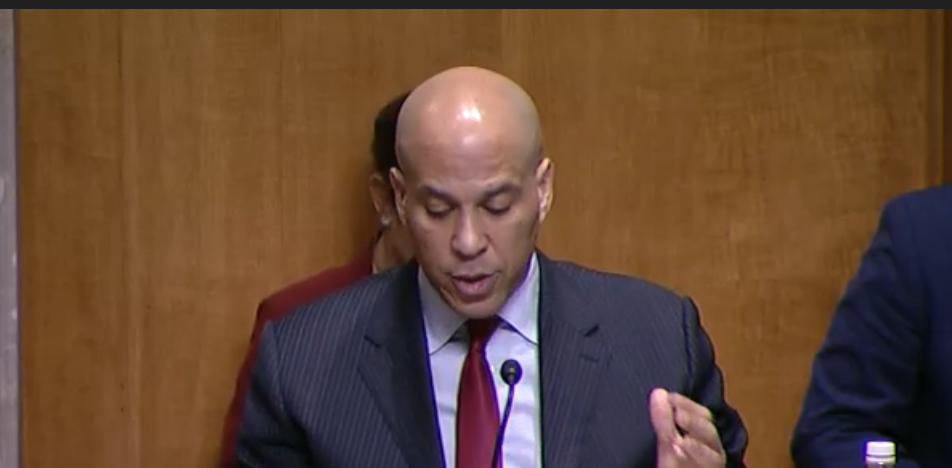Following Emergency Declaration, Senator Booker, Rep. Meng Urge Trump to Increase Mobile Hotspots to Help Students Complete Schoolwork

Following Emergency Declaration, Senator Booker, Rep. Meng Urge Trump to Increase Mobile Hotspots to Help Students Complete Schoolwork
Lawmakers call on President to allocate funding following emergency declaration
Digital divide acutely impacts low-income students, students of color
WASHINGTON, D.C. – U.S. Senator Cory Booker (D-NJ) and Congresswoman Grace Meng (D-NY) today sent a letter to President Trump urging him to increase the availability of mobile hotspots during the Coronavirus outbreak to help students complete their schoolwork. The call comes on the heels of Trump’s emergency declaration this afternoon, as well as yesterday’s announcement by Bergen County that 75 County school districts will close and use online learning as a result of the virus.
In the letter to President Trump, Booker and Meng called on the President to set aside $1 billion in emergency declaration funds so that schools and libraries can purchase the hotspots.
“As the Center for Disease Control and Prevention (CDC) begins advising schools to plan for possible interruptions, and as many schools shift toward a virtual classroom, we urge you to take action to protect the educational opportunities for the 12 million American students who live in homes without a broadband connection,” the lawmakers wrote in the letter, noting that low-income students, and students of color would be hardest hit.
Full text of Booker and Meng’s letter can be found below and here.
Background on Senator Booker’s response to the Coronavirus:
Yesterday, Booker joined Senators Kirstin Gillibrand (D-NY) and Kamala Harris (D-CA) in urging the Senate to include paid family leave and paid sick days in any economic package it passes. He also yesterday introduced a bill to address U.S. supply chain vulnerabilities exposed by COVID-19 and a bill to get unemployment assistance more quickly to laid-off workers.
Booker has also introduced legislation to require health insurance plans to cover both testing and treatment related to the virus, with no cost-sharing to patients. Booker has also written to the White House about concerns that international travelers are not being screened properly at U.S. airports, and he’s urged Senate leaders and the HHS Secretary to prioritize funding for state and local health departments, which are on the front lines of this public health crisis.
In January, as cases of Coronavirus began to spike, he and Senator Robert Menendez (D-NJ) successfully pushed the Centers for Disease Control and Prevention for heightened passenger screening at Newark Liberty International Airport along with other U.S. ports of entries. Booker has also joined letters to the Administration urging it to establish clear guidelines for state and local governments to receive federal reimbursement for costs incurred dealing with the outbreak and to issue an emergency protective order to protect front-line workers.
The Honorable Donald J. Trump
President of the United States
The White House
1600 Pennsylvania Avenue, NW
Washington, DC 20500
Dear President Trump:
As the Center for Disease Control and Prevention (CDC) begins advising schools to plan for possible interruptions, and as many schools shift toward a virtual classroom, we urge you to take action to protect the educational opportunities for the 12 million American students who live in homes without a broadband connection.
As schools and school districts are beginning to shift instruction online in an effort to protect their students from the spread of COVID-19, there are approximately 12 million students across the country that fall into “the homework gap,” meaning they do not have access to the technology they need to participate in an online learning environment.[1] In 15 states across the country, the majority of students in rural areas do not have access to broadband.[2] And, the lack of access to broadband is particularly concerning for low-income students and students of color as these groups are less likely to have access to broadband than their counterparts[3].
Now that you have issued an Emergency Declaration pursuant to the Stafford Act for states preparing for and responding to the coronavirus disease 2019 (COVID-19) outbreak, we urge you to set aside at least $1 billion of the $42.6 billion available in the Disaster Relief Fund (DRF) for schools and libraries to purchase mobile hotspots, and for the Federal Communications Commission to use its universal service powers, so that all students can continue to learn while we work together to respond to the spread of COVID-19. Given the current circumstances, students without access to broadband risk being left behind, a scenario that could cause irreparable harm to the long-term education of 12 million American children.
Several local school districts across the country have already taken action and provided mobile hotspots to students without broadband access, but not all students live in communities that have the resources to provide for those students. Federal assistance is needed to ensure that the challenges faced by our most vulnerable students are not exacerbated by this crisis. It is critical that your response to the COVID-19 outbreak consider the needs of these students, and we strongly urge you to provide the necessary resources to allow them to continue learning.
CC:
The Honorable Betsy Devos, Secretary of Education
The Honorable Ajit Pai, Chairman of the Federal Communications Commission








